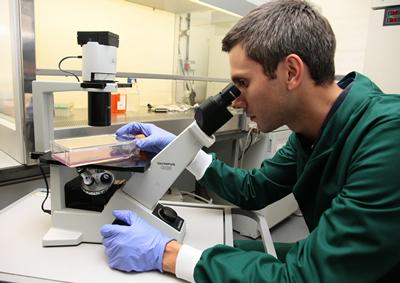Southampton researchers lead ‘first of its kind’ study to extend lives of men with incurable prostate cancer

Researchers from the University of Southampton are set to lead a new precision medicine study for prostate cancer which has the potential to extend the lives of 9,000 men every year in the UK.
The study is part of a major new research programme launched today by men’s health charity, Prostate Cancer UK.
The research drive will tailor treatments for men based on the genetic make-up of their cancer and marks a significant shift from the traditional ‘one size fits all’ approach to treatment, towards identifying what drives an individual man’s cancer, and which drugs will work best to stop it in its tracks.
The £1.4million study involves researchers Glasgow, Belfast, Manchester and London and is led by Dr Simon Crabb, Associate Professor in Medical Oncology at the University of Southampton.
“Women diagnosed with advanced breast cancer receive treatment depending on the type of disease they have and are assigned the drugs that will work best for their individual cancer” Dr Crabb said. “This precision medicine approach currently isn’t available to men with prostate cancer which is why this research is so important.
“Investigators at over 100 hospitals across the UK have been assembled to study thousands of tumours and develop tests, which will help clinicians understand which drug or combination of drugs will work best for an individual patient. This is more than just a clinical trial and researchers from both the lab and the clinic will be working side by side in a bid to bring about change as quickly as possible. As a result, we’ll be in a position to open the first arm of the trial to patients from as early as next year, whilst we continue to develop new treatments and precision medicine approaches in the lab.”
The researchers will focus on developing targeted treatment pathways specifically for men with advanced disease not yet resistant to hormone therapy. The study, which has been co-funded by Prostate Cancer UK, the Movember Foundation and the Distinguished Gentleman’s Ride will tackle three key issues:
Identify changes in the DNA make up of prostate cancer cells not yet resistant to hormone therapy, that are responsible for driving the cancer cell growth.
Develop a test which can easily detect these genetic changes.
Establish which drugs best target the genetic changes and prevent the cancer from spreading further.
Dr Iain Frame, Director of Research at Prostate Cancer UK said: “Every man’s prostate cancer is unique to him and so not surprisingly the way men respond to treatments varies enormously. Clinicians are in effect left to treat patients ‘in the dark’ – with little idea as to which treatments will work best for which men.
“However, this new research programme could be game changing, providing clinicians with the much clearer picture they desperately need. It will enable them to go straight to the right treatment for each individual man, saving precious time for those men who often have little time left.”
Prostate cancer is the most common cancer in men, with over 47,000 new diagnoses every year in the UK. Around a quarter of these are diagnosed after the cancer cells have spread to other parts of the body, reducing the chances of successful treatment and survival.
Men diagnosed with advanced prostate cancer are typically treated with hormone therapy, and move on to life extending treatments such as Docetaxel, Abiraterone and Enzalutamide once hormone therapy has stopped working. The first study of Prostate Cancer UK’s precision medicine programme will specifically focus on men with advanced prostate cancer before it has become resistant to hormone therapy.
For further information on Prostate Cancer UK’s precision medicine research programme, visit: https://prostatecanceruk.org/christmas2017
